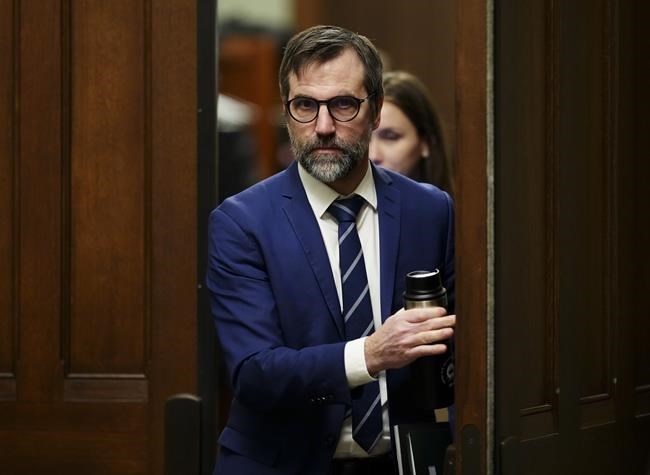OTTAWA — Canada is creating a national registry to track plastic production and pollution, Environment Minister Steven Guilbeault said Monday, with Ottawa set to host another round of negotiations toward a global treaty to end plastic waste.
The talks, set to kick off on Tuesday, seek to find international agreement on how to tackle the world's plastics habit, in a similar vein to the 2015 Paris Agreement on climate change.
Guilbeault said one of the keys to making it work is for countries like Canada to have a better handle on what plastic we're making and what happens to it.
Since 2022, Environment and Climate Change Canada has been consulting on the development of a plastics registry, similar to how it tracks greenhouse-gas emissions.
The registry is to be phased in over the next few years.
Guilbeault said it will make plastics producers more responsible for what they are putting on the market.
"What we're aiming to do with this registry is to ensure that there's more transparency in Canada on the production and use of plastics," he said.
"It is hard to tackle a problem if you don't know what it is, where it is, what's being used."
For years, Canada has asked industries to report on emissions they produce, and those data are a critical component of Canada's annual reporting on total emissions.
Guilbeault said the plastics registry will be similar. Companies that produce or import plastic in Canada will have to report every year how much of it they are putting on the market, along with how much plastic waste they generate.
That includes reporting on how much they send for recycling or reuse, versus how much is simply tossed out.
The registry will start with plastic packaging, electronics and single-use items, and eventually expand to include plastic resins, tires and plastic products for agriculture.
Statistics Canada reported that in 2019, 6.2 million tonnes of plastic was produced in Canada, more than one-third of it for packaging alone.
Canada also estimates that more than four million tonnes of plastic ends up as waste each year, and less than one-tenth of that is recycled.
The registry announcement is the first of several domestic moves Guilbeault is expected to make on plastics this week, as delegates from more than 170 countries descend on a downtown Ottawa convention centre to make progress on a global plastics treaty.
Guilbeault, who was key to getting a UN motion passed in 2022 that set the process for the treaty talks in motion, said it is a "once-in-a-generation opportunity."
There is growing evidence about the physical harm all the plastics we produce is causing, as production has nearly doubled in 20 years and plastic itself never really disappears.
Instead, it breaks down into microparticles of plastic that end up in our water, our food and our air.
Microplastics are linked to a string of health concerns including hormone disruptions, cancers and infertility.
The treaty is bent on attacking that problem.
"We're leaving a legacy of environmental disaster for future generations if we fail to act," Guilbeault said.
Inger Andersen, the executive director of the UN Environment Program, said Monday that a successful treaty must have clear and measurable targets, with specific timelines and agreement that unnecessary single-use and problematic plastics must be phased out.
She also said recycling must be improved and the treaty must address "chemicals of concern," a list of toxic chemicals used to make plastics that are hazardous to human health.
"We are on the cusp of securing a just and ambitious treaty that addresses that full life cycle," she said.
The Ottawa talks are the fourth of five scheduled rounds. Earlier talks were held in Uruguay in 2022, and in Paris and Kenya in 2023. The goal is that by the end of this year, at the fifth round in South Korea, a treaty can be finalized.
Dr. Adil Najam, president of the Worldwide Fund for Nature, said if a full treaty is to be possible by the end of the year, the Ottawa talks must reach agreement on the need to ban the most problematic plastics and chemicals.
Delegates must also agree to hold formal talks between the Ottawa negotiations and those scheduled at the end of November, Najam said.
Guilbeault said there are some areas where there is widespread agreement, including banning some single-use plastics and "chemicals of concern," the need for plastics to contain more recycled content and the need for more transparency in labelling so consumers know what is in the plastics they are buying.
What he said is still not clear is whether the treaty will include very specific elements, such as which chemicals to ban, or whether it's more of a framework with "details to come later."
"I think this is still an area where countries need more time to discuss and exchange," he said.
This report by The Canadian Press was first published April 22, 2024.
Mia Rabson, The Canadian Press



